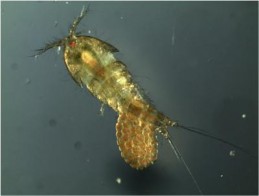Can evolution outpace climate change?
June 9, 2011

The tide pool copepod Tigriopus californicus showed little ability to evolve heat tolerance over 10 generations (credit: Morgan Kelly, UC Davis)
Ecologists at the University of California, Davis have determined that animals and plants may not be able to evolve their way out of the threat posed by climate change.
The ecologists examined the tide pool copepod Tigriopus californicus that is found from Alaska to Baja California, but found that the animals show little ability to evolve heat tolerance.
The researchers grew the short-lived copepods in the lab for 10 generations, subjecting them to increased heat stress to select for more heat-tolerant animals.
At the outset, copepods from different locations showed wide variability in heat tolerance. But within those populations, the ecologists were able to coax about a half-degree Celsius (about one degree Fahrenheit) of increased heat tolerance over 10 generations. And in most groups, the increase in heat tolerance had hit a plateau before that point.
“It’s been assumed that widespread species have a lot of genetic capacity to work with, but this study shows that may not be so,” said Professor Rick Grosberg.
Ref.: M. W. Kelly, E. Sanford, R. K. Grosberg, Limited potential for adaptation to climate change in a broadly distributed marine crustacean, Proceedings of the Royal Society B: Biological Sciences, 2011; [DOI: 10.1098/rspb.2011.0542]